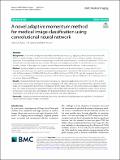DSpace Repository
Midkine can not be accepted as a new biomarker for unexplained female infertility
- DSpace Home
- →
- Web Of Science
- →
- Web Of Science
- →
- View Item
JavaScript is disabled for your browser. Some features of this site may not work without it.
| dc.contributor.author | Aytaç, Utku Can
|
|
| dc.date.accessioned | 2024-04-15T06:49:23Z | |
| dc.date.available | 2024-04-15T06:49:23Z | |
| dc.date.issued | 2024 | |
| dc.identifier.issn | 0250-4685 | |
| dc.identifier.uri | http://hdl.handle.net/11547/11466 | |
| dc.description.abstract | Background AI for medical diagnosis has made a tremendous impact by applying convolutional neural networks (CNNs) to medical image classification and momentum plays an essential role in stochastic gradient optimization algorithms for accelerating or improving training convolutional neural networks. In traditional optimizers in CNNs, the momentum is usually weighted by a constant. However, tuning hyperparameters for momentum can be computationally complex. In this paper, we propose a novel adaptive momentum for fast and stable convergence. Method Applying adaptive momentum rate proposes increasing or decreasing based on every epoch's error changes, and it eliminates the need for momentum hyperparameter optimization. We tested the proposed method with 3 different datasets: REMBRANDT Brain Cancer, NIH Chest X-ray, COVID-19 CT scan. We compared the performance of a novel adaptive momentum optimizer with Stochastic gradient descent (SGD) and other adaptive optimizers such as Adam and RMSprop. Results Proposed method improves SGD performance by reducing classification error from 6.12 to 5.44%, and it achieved the lowest error and highest accuracy compared with other optimizers. To strengthen the outcomes of this study, we investigated the performance comparison for the state-of-the-art CNN architectures with adaptive momentum. The results shows that the proposed method achieved the highest with 95% compared to state-of-the-art CNN architectures while using the same dataset. The proposed method improves convergence performance by reducing classification error and achieves high accuracy compared with other optimizers. | tr_TR |
| dc.language.iso | en | tr_TR |
| dc.relation.ispartofseries | 48;6 | |
| dc.subject | ANTI-MULLERIAN HORMONE | tr_TR |
| dc.subject | DIMINISHED OVARIAN RESERVE | tr_TR |
| dc.title | Midkine can not be accepted as a new biomarker for unexplained female infertility | tr_TR |
| dc.type | Article | tr_TR |
Files in this item
This item appears in the following Collection(s)
-
Web Of Science [994]
